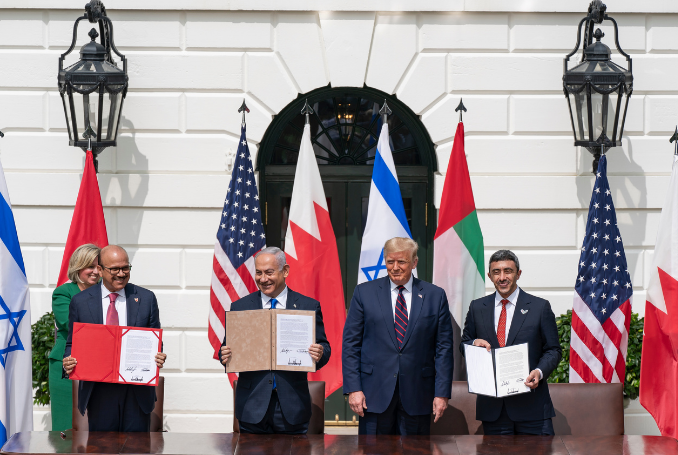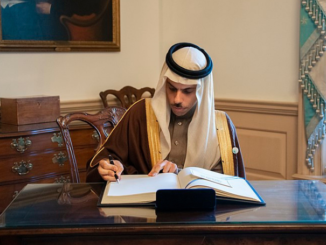
By Jamal Kanj
Ascribing the euphemism, peace, for formally normalizing the relationship between the United Arab Emirates (UAE) and the smaller Island of Bahrain with Israel, is an abysmal attempt to repackage Jarred Kushner’s string of failures and Donald Trump’s obsession for a pseudo achievement in a difficult election year.
Perched behind the Resolute desk on August 13, Trump mispronounced the name of the UAE Crown Prince, Mohamed bin Zayed, proclaiming what he described as the first “Historic Peace Agreement” in 25 years. Archetypical of the President self-aggrandizing, he professed, “Everybody said this would be impossible …”
“Everybody,” possibly except for Trump and Kushner, had known of UAE and Bahrain, not so secretive, back channels with Israel. In October 2018, the racist Israeli minister of culture, who likened the mosque’s Azan to barking dogs, was welcomed in Abu Dhabi, toured Sheikh Zayed Mosque, and Israel’s national anthem played in the UAE capital.
In June 2019, on the side of Kushner’s botched “deal of the century” peace conference in Manama, Israeli journalists posed openly next to landmarks around the Bahraini capital
With a background in real estate, both Kushner and his father in law, Trump, came from an industry imbued with apathetic market manipulators who inflate value to sell, and undervalue assets to buy. The culture had molded Kushner’s personality at a young age. Most of his recognized successes in the private business accredited to arm-twisting economically distressed property owners and the evictions of low-income renters in New York.
The same knack that gave Kushner an advantage in the world’s financial capital was in itself the very reason for his abject failure in brokering peace between Palestine and Israel. Ironically, however, the same had led to the superficial success in the normalization of the relation between the two Arab states and Israel.
In the first instance, and despite reading twenty-five books on the Palestine Israeli issue, Kushner flunked the test. He failed for employing New York techniques and misconstruing the seventy years grievance for an opportunity to coerce the economically distressed Palestinians to accept a bad deal.
A plan prepared by Jason Greenblatt, Avi Berkowitz, David Friedman, and presented by Kushner, all bona fide American Zionists. Kushner and Friedman are major donors subsidizing illegal “Jewish only” colonies over the same occupied Palestinian land slated for negotiation in their peace plan. Besides the conflict of interest, Kushner and company are ideologically incapable of being objective intermediaries.
On the second, his approach succeeded because his Arab counterparts were susceptible to New York street pressure and had much deficit to reconcile with the Trump Administration.
Unlike previous US presidents, Trump reminded Arab Gulf Royals bluntly that America’s protection was the only legitimacy they have to maintain their DNA qualified familial rules. In October 2018 at a campaign stop, Trump addressed the Saudi King, “You might not be there for two weeks without us.”
Following the CIA conclusion that Saudi Crown Prince, Mohamed bin Salman, had ordered the murder and dismemberment of Washington Post columnist Jamal Khashoggi. Trump shared a practical example of his role when he bragged in a recorded conversation with Bob Woodard how he saved the Saudi Crown Prince “ass.”
While a Saudi payback would have been the preferred option to temper Kushner’s list of failures, however―typical of a New York real estate loser―he settled for a diminutive faux peace between parties that had never engaged in war.
The formal normalization of the back channels is the product of a symbiotic relationship between Trump and the Arab Gulf Royals. Having mismanaged COVID-19 and aftermath economic crises, Trump despaired for an election boost, possibly a stunt to gain favor with pro-Israeli voters in swing states like Pennsylvania and Florida.
Gulf Royals on the other hand, fear a new American administration where US Congress could reopen the CIA findings on the murder of the Washington journalist, vote to halt US weapons or investigate Amnesty International reports asserting Saudi led war crimes in Yemen.
Fright in the Gulf, election anxiety in Washington crafted the opportunity for a mediocre accord between Israel and two Arab rulers lacking valid popular legitimacy.
This week, Kushner stands to celebrate another faux achievement. Following three and a half years, he produced a molehill when he promised a mountain of a deal. Or to paraphrase a well-known Arabic proverb: after long and arduous birth pangs, the camel gave birth to a mouse.
– Jamal Kanj is the author of “Children of Catastrophe,” Journey from a Palestinian Refugee Camp to America. His second coauthored novel, “Bride of the Sea,” published in Germany and Poland. He can be reached at jamal@jamalkanj.com. He contributed this article to The Palestine Chronicle.

– Jamal Kanj is the author of “Children of Catastrophe,” Journey from a Palestinian Refugee Camp to America, and other books. He writes frequently on Arab world issues for various national and international commentaries. He contributed this article to The Palestine Chronicle








